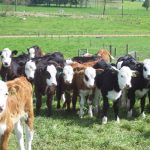
Consumers are paying less for dairy — is the lower farmgate price the factor behind the cost shift?
Deflationary conditions are boosting Australian dairy sales at home and abroad, with a China domestic dairy slowdown aiding Aussie farmer prospects.
As farmgate prices failed to step up in spring, processors passed on some of the gains to consumers with cheese prices deflationary for the first time in three years.
New figures from Dairy Australia released Wednesday confirm the nationwide volume of cheese, butter and dairy spreads as well as yoghurt have increased 2.1 per cent, 3.2 per cent and 7.0 per cent respectively.
Dairy Australia industry analyst Eliza Redfern said data contained in the latest situation and outlook report confirmed dairy sales largely strengthened in 2024.
The outlier were milk sales, which remained steady despite a cut the cost of generic milk from $1.60 to $1.55 per litre by Aldi, Coles and Woolworths.
“There’s several factors behind the dairy deflation. We have retailers retargeting shelf prices of some private label dairy products,” Ms Redfern said.
“We also have the Australian Competition and Consumer Commission closely monitoring inflation in the grocery sector, — so that means value growth across the main dairy categories may soon slow.
“Dairy was the only category in the latest Bureau of Statistics consumer price monitoring report which are tracking below last year.”
China’s domestic dairy industry endured a rough 2023-24 financial year with sales at the nation’s top dairy firms falling between 9 and 13 per cent.
Among the biggest losers were China Mengniu Dairy with a 12.6 per cent revenue slump to 44.7 billion yuan ($A9.4 billion) in the six months to June, while rival Inner Mongolia Yili Industrial Group’s sales fell 9.5 per cent to 59.9 billion yuan ($12.6 billion).
However, the new financial year is spelling something of a turnaround for Australian and other international sellers into China.
Consecutive sessions of the Global Dairy Trade index have been moving into positive territory, despite China’s tepid economic performance throughout 2024.
“It does appear from the most recent few GDT index numbers that Chinese demand for international milk is improving,” Ms Redfern said. “In the past two to three months, there’s been positive signs for Chinese interest in dairy and as a country, it remains our largest buyer of exported dairy.”
Rabobank dairy analyst Michael Harvey said Australian dairy exports had a solid season in 2023/24, despite China’s weakening dairy appetite.
“China’s demand for dairy is coming from the weakening supply side there, rather than any big changes on the local demand side,” he said.
“There’s been a drought in parts of China, there’s been a number of farm exits — so supply has weakened domestically in China and therefore we’re starting to see demand increase for dairy imports, including Australia.”
You can now read the most important #news on #eDairyNews #Whatsapp channels!!!
🇺🇸 eDairy News INGLÊS: https://whatsapp.com/channel/0029VaKsjzGDTkJyIN6hcP1K
























